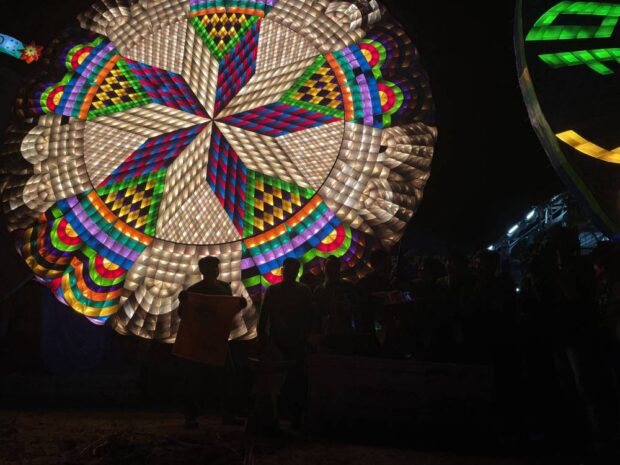
TRADITION LIVES ON | The lantern of Barangay Telabastagan emerges as the winner in the annual “Ligligan Parul” (Giant Lantern Festival), a religious tradition of 115 years in the City of San Fernando in Pampanga. (Photo by TONETTE T. OREJAS / Inquirer Central Luzon)
CITY OF SAN FERNANDO, Pampanga, Philippines — For the fifth time now, lantern maker Arnel Flores, from the village of Telabastagan here, bagged the championship in the 115th Giant Lantern Festival for “the best replica” of the Star of Bethlehem that brightened the night at the birth of the Child Jesus long ago.
Flores took home P300,000 in this year’s “Ligligan Parul” competition, beating nine other villages. Representatives from barangays San Nicolas and San Juan won second and third place, respectively.
The lanterns of Flores in 2007, 2008, 2013 and 2018 were also adjudged champion.
“This is beyond amazing. The Fernandinos (residents of this city) showed their cultural creativity,” the Catholic Church’s Papal Nuncio to the Philippines, Archbishop Charles John Brown, said in an interview after he and five others judged the contest on Saturday.
Brown, the representative of Pope Francis in the country, said it was his first time to see the festival that was documented to have started in 1908 in Pampanga, the first Catholic province inaugurated in Luzon by Spain in 1571.
Showdowns
At the festival’s opening on Saturday night, Mayor Vilma Caluag told the spectators that the lanterns “represent a deep faith in God and optimism for a bright future.”
In the first showdown that lasted seven minutes, Flores’ team of rotor makers and operators made their lantern “dance” to a medley of songs while turning the rotors left, right, or full circle to be able to sync the lights with the beat of the music. Rotors are aluminum barrels connected to electricity, which is transmitted to thousands of bulbs through kilometers of wires that adorn their creation.
The Telabastagan lantern burst into more than 50 patterns in a myriad of colors in the shapes of flowers, fans and geometric forms.
Flores employed again a technique that isolated one half of the lantern from the other half, allowing him to play smaller light patterns. He used smaller rotors to be able to let out images of an angel and the Holy Spirit while displaying words like “Heart of Jesus,” “Peace” and “Faith.“
“Atin yang boses ing parul (the lantern has a voice),” Flores said of the messages that were incorporated in his handmade creation.
The lantern was 20 meters in diameter and fitted with 11,400 bulbs controlled by 10 rotors — a local invention in the 1960s by Pambusco bus company mechanic Severino David, which ended the era of “kalakate” (main wire with a loop connected to a set of bulbs) in the 1950s, records show.
The San Nicolas lantern by Edmar David twinkled with small stars and projected an angel that evolved into a large cross that screamed “Love Forever.” David and his niece Angelica, thought to be the first female rotor maker, used mostly the colors orange, brown and green.
Craftsmen
While last year’s winner San Juan failed to get a back-to-back victory, the lantern crafted by Mark Niño Flores, Arnel’s son, was considered the most playful.
Mark isolated each quarter of the lantern to show images of Jesus, Rudolph the red-nosed reindeer, and Santa Claus before ending with “Merry Christmas.”
The lanterns traditionally and simultaneously danced to a brass band. The Lumanog’s Band 48, under the baton of Edwin Lumanog, provided the music in the third and last showdown.
The soundtrack of the original Japanese anime “Voltes V” continued to be a favorite song in the medleys.
Except for Mark, the rest of the lantern makers in the 2023 festival were protégés of lantern makers who were already old or had died.
The more established ones — Roland Quiambao, Ernesto Quiwa, and his sons Eric and Arvin (descendants of the 1908 pioneer Francisco Estanislao of Barangay Sta. Lucia) — did not participate this time due to various reasons, city tourism officer Ma. Lourdes Carmella Jade Pangilinan confirmed.